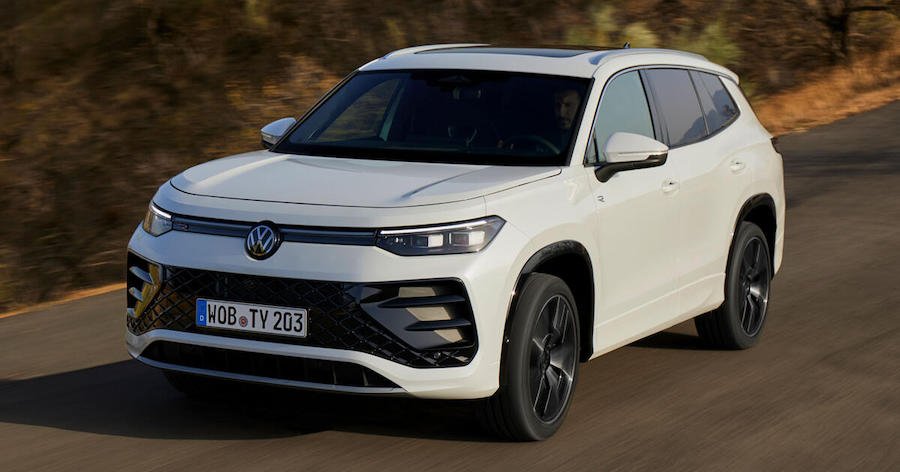The New Volkswagen Tayron Is America's Next Tiguan

[UPDATE] Volkswagen of America has confirmed the US will be getting a long-wheelbase Tiguan but mentions that its "sheet metal, powertrain options, and equipment set will differ markedly." The new US-spec Tiguan debuts later this year. If it won't be a spitting image of the Tayron, it could have more in common with the Chinese-market Tayron L.
Tayron isn't a new name in Volkswage's lineup. It's been around in China since 2018 and is now making its way into the company's European portfolio. What is it? Essentially, a seven-seat version of the latest-generation Tiguan. In other words, it replaces the old Tiguan Allspace sold in Europe. It's also an accurate preview of America's next compact three-row crossover, which will retain the Tiguan moniker.
Positioned between the Tiguan and the larger, fancier Touareg we don't get in the United States, the new Tayron isn't a seven-seat-only affair since it can be had with only two rows as well. You can think of it as VW's equivalent of the Skoda Kodiaq. Inside and out, the design is not much of a surprise considering it looks pretty much like a stretched Tiguan. Well, that's because it is.
It's 187.8 inches (4770 millimeters) long, making it 9 inches (231 millimeters) longer than the SUV upon which it's based. To accommodate that third row, its wheelbase has been extended by 4.5 inches (114 millimeters) to 109.8 inches (2791 millimeters). The Tayron is 72.9 inches (1852 millimeters) wide and 65.3 inches (1660 millimeters) tall, with both numbers slightly higher than those of the Tiguan.
As you can imagine, this is an immensely practical SUV. Cargo capacity behind the seats varies from 12.2 cubic feet (345 liters) for the third-row version to 31.2 cubic feet (885 liters) for the two-row model. Fold the second row and the volume jumps to 73.8 cubic feet (2,090 liters) for the two-row model and to 67.2 cubic feet (1,905 liters) for the three-row configuration.
Go for the hybrid version and those numbers will be lower because the battery pack takes up space: 24.9 cubic feet (705 liters) with the rear seats up and 67.6 cubic feet (1,915 liters) after folding them. It's worth noting the electrified Tayron will be sold strictly with two rows of seats.
All flavors of the Tayron get a dual-clutch automatic transmission with six gears for the plug-in hybrids and seven for the conventionally powered models. The PHEVs are strictly front-wheel drive, much like the base gas and diesel engines. In entry-level guise, the new SUV relies on a 1.5-liter turbocharged gasoline engine with 148 horsepower and 184 pound-feet (250 Newton-meters) of torque. This engine has mild-hybrid tech and can run on just two cylinders to save fuel when the extra power is not needed.
Joining the 1.5 eTSI engine is a thrifty 2.0 TDI diesel with the same 148 hp but a much higher 266 lb-ft (360 Nm). Step up to the more potent 2.0 TDI with all-wheel drive and you get 201 hp and 295 lb-ft (400 Nm). VW will also sell the Tayron with a couple of 2.0 TSI gas engines, one with 148 hp and 236 lb-ft (320 Nm) and the other with 261 hp and 295 lb-ft (400 Nm).
Diesel engines have gradually fallen out of favor in Europe in the aftermath of the Volkswagen Group’s messy Dieselgate so more people are switching to plug-in hybrids. There’s one with 201 hp and another with 268 hp, with both combining a 1.5-liter turbo gas engine with an electric motor. The PHEVs share a lithium-ion battery pack featuring a usable energy content of 19.7 kWh and support for DC charging at 50 kW. A full charge lasts for more than 62 miles (100 kilometers). Combined with the gas tank, a Tayron eHybrid can cover around 528 miles (850 kilometers).
As with other recent VWs, there's a massive 15-inch touchscreen inside, sticking out of the dashboard like a sore thumb. It's basically a tablet, with no effort to integrate the infotainment display into the dash. The driver's digital instrument cluster measures 10.25 inches, and we're surprised there isn't an extra screen just for the passenger. Some VW Group cars have that now, including the new extra-long Passat Pro for China.
Echoing the latest models from the German automaker, there are sadly few conventional buttons. Seeing the glass half full, the touch sliders located below the center screen for temperature control and audio volume are illuminated. Absurdly, that wasn't the case with the Golf Mk8 before the mid-cycle facelift launched this year.
Since we mentioned the Skoda Kodiaq earlier, Czechia's three-row SUV should be easier to live with on a daily basis. That's because it has more old-school buttons than the Tayron, along with configurable rotary knobs with built-in screens. Why isn't VW using those? It feels like the company is sabotaging itself by making Skodas more desirable.
You'll be glad to see traditional buttons on the steering wheel instead of those frustrating capacitive-touch keys. Although this isn’t a premium model from Audi, the Tayron gets some notable goodies inside. We’re talking about ventilated and massaging front seats, along with a windscreen head-up display, a Harman Kardon sound system, and 30-color ambient lighting.
Built at home in Wolfsburg, Germany, the VW Tayron goes on sale in Europe this fall in Life, Elegance, and R-Line flavors. There's no word yet about its Tiguan equivalent for America but logic tells us it can't be far behind. Expect the US-bound model to arrive next year. In the meantime, we'll see the Tayron in a few days at the 2024 Paris Motor Show.
